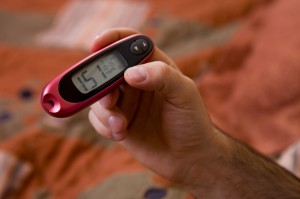 25.8 million people in the United States have diabetes, according to the American Diabetes Association. Because of the current prevalence of this disease, the expected increase in people suffering from it (an estimated 79 million US adults & children are pre-diabetic), and the devastating effects the disease can have (including blindness, amputation, heart disease and death), curing and treating diabetes is a top priority for many in the medical community. Two new studies (1,2) have shown that bariatric surgery may be a highly promising option for obese patients with diabetes. In these two studies, investigators describe the results of standard or intensive medical care versus bariatric surgery in severely obese patients with type 2 diabetes. Until now, only one randomized, controlled trial (3) has shown the superiority of surgery (gastric banding) over medical care. These provide further evidence that surgery can be more efficient than either standard or intensive medical treatment alone.
25.8 million people in the United States have diabetes, according to the American Diabetes Association. Because of the current prevalence of this disease, the expected increase in people suffering from it (an estimated 79 million US adults & children are pre-diabetic), and the devastating effects the disease can have (including blindness, amputation, heart disease and death), curing and treating diabetes is a top priority for many in the medical community. Two new studies (1,2) have shown that bariatric surgery may be a highly promising option for obese patients with diabetes. In these two studies, investigators describe the results of standard or intensive medical care versus bariatric surgery in severely obese patients with type 2 diabetes. Until now, only one randomized, controlled trial (3) has shown the superiority of surgery (gastric banding) over medical care. These provide further evidence that surgery can be more efficient than either standard or intensive medical treatment alone.
In one of the studies, Schauer et al (1) from Cleveland Clinic studied 150 patients with Type 2 Diabetes (BMI between 27-43 kg/m2, with approximately 1/3 of patients having a BMI <35, an average duration of diabetes of more than 8 yrs, a mean baseline glycated hemoglobin level of 8.9 to 9.5%, an average of nearly 3 diabetes agents, including a relatively high use of insulin –in 44% of patients-), randomized in 3 groups treated either by intensive medical therapy, gastric bypass or sleeve gastrectomy. After 1 year, the primary end point, a glycated hemoglobin level of 6% or less, was achieved in 12% of patients in the medical therapy group versus 42% in the gastric bypass group and 37% in the sleeve gastrectomy group.
In the other study, Mingrone et al (2) from the Catholic University of Rome Italy randomized 60 patients with Type 2 Diabetes (BMI >35 kg/m2 with an average BMI of 45, history of diabetes of more than 5 years, and a glycated hemoglobin level of 7.0% or more) who underwent Roux-en-Y gastric bypass, biliopancreatic diversion, or standard medical therapy. After 2 years, patients who had undergone either of the two surgical procedures had better glycemic control than did those receiving medical therapy. Rates of complete remission of diabetes were 75% for gastric bypass and 95% for biliopancreatic diversion, as compared with no remissions for medical therapy. In the surgical groups, both weight loss and preoperative BMI were not predictors of diabetes control, which suggest that such surgical procedures may exert effects on diabetes that are independent of weight.
We spoke to Dr. Jaime Ponce who told us, “These two studies are likely to have a major effect on future diabetes treatment. Bariatric surgery should be included in future algorithms for the treatment of Type 2 Diabetes as suggested by the 2011 International Diabetes Federation position statement (4). High level of evidence studies were needed for further documentation and acceptance by the payors and medical community in general. The treatment for patients with lower body-mass index (BMI < 35 kg/m2) has been also addressed; this becomes an issue when the diabetes control is not optimal with medical therapy in these patients.”
Related Reading: Diabetes Epidemic Looming?
References:
1. Schauer PR, Kashyap SR, Wolski K, et al. Bariatric surgery versus intensive medical therapy in obese patients with diabetes. N Engl J Med 2012. DOI: 10.1056/NEJMoa1200225.
2. Mingrone G, Panunzi S, De Gaetano A, et al. Bariatric surgery versus conventional medical therapy for type 2 diabetes. N Engl J Med 2012. DOI: 10.1056/NEJMoa1200111.
3. Dixon JB, O’Brien PE, Playfair J, et al. Adjustable gastric banding and conventional therapy for type 2 diabetes: a randomized controlled trial. JAMA 2008;299:316-23.
4. Dixon JB, Zimmet P, Alberti KG, Rubino F. Bariatric surgery: an IDF statement for obese Type 2 diabetes. Diabet Med 2011;28:628-42.






Trackbacks/Pingbacks
[…] The second study followed 60 obese patients with diabetes, who were assigned to either have bariatric surgery (gastric bypass or biliopancreatic diversion) or non-surgical medical treatment. Similarly to the Cleveland Clinic study, this study showed that the surgical procedures had much greater effects on diabetes. After two years, the patients who had surgery had better glycemic control than the patients who had medical therapy. Additionally, 75% of the gastric bypass patients and 95% of the biliopancreatic diversion patients showed complete remission of their diabetes. Conversely, none of the patients who had medical treatment had complete remission of their diabetes. You can read more about the studies here […]